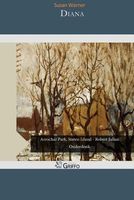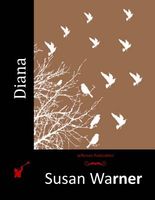- Welcome to FictionDB, Guest
- | My Account
- | Help

Diana — Susan Warner
I am thinking of a little brown house, somewhere in the wilds of New England. I wish I could make my readers see it as it was, one June afternoon some years ago. Not for anything very remarkable about it; there are thousands of such houses scattered among our hills and valleys; nevertheless one understands any life story the better for knowing amid what sort of scenes it was unfolded. Moreover, such a place is one of the pleasant things in the world to look at, as I judge. This was a small house, with its gable end to the road, and a lean-to at the back, over which the long roof sloped down picturesquely. It was weather-painted; that was all; of a soft dark grey now, that harmonized well enough with the gayer colours of meadows and trees. And two superb elms, of New England's own, stood beside it and hung over it, enfolding and sheltering the little old house, as it were, with their arms of strength and beauty. Those trees would have dignified anything. One of them, of the more rare weeping variety, drooped over the door of the lean-to, shading it protectingly, and hiding with its long pendant branches the hard and stiff lines of the building. So the green draped the grey; until, in the soft mingling of hues, the light play of sunshine and shadow, it seemed as if the smartness of paint upon the old weather-boarding would have been an intrusion, and not an advantage. In front of the house was a little space given to flowers; at least there were some irregular patches and borders, where balsams and hollyhocks and pinks and marigolds made a spot of light colouring; with one or two luxuriantly-growing blush roses, untrained and wandering, bearing a wealth of sweetness on their long, swaying branches. There was that spot of colour; all around and beyond lay meadows, orchards and cultivated fields; till at no great distance the ground became broken, and rose into a wilderness of hills, mounting higher and higher. In spots these also showed cultivation; for the most part they were covered with green woods in the depth of June foliage. The soft, varied hilly outline filled the whole circuit of the horizon; within the nearer circuit of the hills the little grey house sat alone, with only one single exception. At the edge of the meadow land, half hid behind the spur of a hill, stood another grey farm-house; it might have been half a mile off. People accustomed to a more densely populated country would call the situation lonesome; solitary it was. But Nature had shaken down her hand full of treasures over the place. Art had never so much as looked that way. However, we can do without art on a June afternoon.
Genres
Click on any of the links above to see more books like this one.







